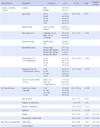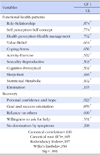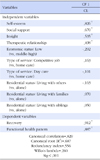Abstract
Purpose
The purpose of this study was to examine the relationship between perceived functional health patterns and recovery in people with schizophrenia spectrum disorders, to explore the magnitude of relationship between of these variables and influencing factors such as self-esteem, insight, therapeutic relationship, and social support.
Methods
Participants were 160 individuals from 16 Community Mental Health Centers in Gyeonggi Province. Data were collected from April 10 to June, 12, 2010. Analysis was done using descriptive data, Pearson's correlation coefficients, and canonical correlation coefficients with the SAS 9.1 program.
Results
The mean score for perceived functional health of participants was below the normal range and the mean for recovery was above the middle range. Functional health and recovery were positively correlated with all components. The magnitude of relationship between functional health pattern, recovery and influencing factors were high in order of self-esteem, social support, insight, and therapeutic relationship.
Figures and Tables
References
1. Corrigan PW, Giffort D, Rashid F, Leary M, Okeke I. Recovery as a psychological construct. Community Mental Health Journal. 1999. 35:231–239.
2. Corrigan PW, Salzer M, Ralph RO, Sangster Y, Keck L. Examining the factor structure of the recovery assessment scale. Schizophrenia Bulletin. 2004. 30:1035–1041.
3. David AS. Insight and psychosis. British Journal of Psychiatry. 1990. 156:798–808.
4. Davidson L, Borg M, Marin I, Topor A, Mezzina R. Processes of recovery in serious mental illness: Findings from a multinational study. American Journal of Psychiatric Rehabilitation. 2005. 8:177–201.
5. Davidson L, Schmutte T, Dineo T, Andres-Hyman R. Remission and recovery in schizophrenia: Practioner and patient perspectives. Schizophrenia Bulletin. 2008. 34:5–8.
6. Deegan P. Recovery: The lived experience of rehabilitation. Psychosocial Rehabilitation Journal. 1988. 11:11–19.
7. Druss BG, Zhao L, Esenwein SA, Bona JR, Fricks L, Jenkins-Tucker S, et al. The Health and Recovery Peer (HARP) Program: A peer-led intervention to improved medical self-management for persons with serious mental illness. Schizophrenia Research. 2010. 118:264–270.

8. Hair JF, Anderson RE, Tatham RE, Black WC. Multivariate data analysis. 1998. 5th ed. Upper Saddle River, New Jersey: Prentice-Hall Inc.

9. Harding CM, Brooks GW, Ashikaga T, Strauss JS, Breier A. The vermont longitudinal study of persons with severe mental illness, I: Methodology, study sample, and overall status 32 years later. American Journal of Psychiatry. 1987. 144:718–726.
10. Hoffmann H, Kupper Z. Facilitators of psychosocial recovery from schizophrenia. International Review of Psychiatry. 2002. 14:293–302.
11. Im YH. A study on the factors which affect the negative dropout in social rehabilitation facility for mentally disabled. 1999. Seoul: Ewha Womans University;Unpublished master's thesis.
12. Jacobson N, Greenley D. What is recovery? A conceptual model and explication. Psychiatric Services. 2001. 52:482–485.
13. Jeon BJ. Self-esteem: A test of its measurability. Yonsei Nonchong. 1974. 11:107–130.
14. Jones D. The development and testing of the Functional Health Pattern Assessment Screening Tool (FHPAST). Journal of Japan Society of Nursing Diagnosis. 2002. 7:24–31.
15. Kim HJ. The relationship between perceive social support and mental health status of persons receiving psychiatric care as out patients. 1991. Seoul: Ewha Womans University;Unpublished master's thesis.

16. Kim HJ. Meaning of recovery from mental illness: Findings of a qualitative study. Journal of Korean Academy of Psychiatric and Mental Health Nursing. 2009. 18:379–389.

17. Kim IH, Park HJ, Kim EH. The effect of weight control program on body weight and knowledge and attitude about exercise and diet of psychiatric inpatients. Clinical Nursing Research. 2007. 13:145–155.

18. Kim NR. A study on the recovery of Korean chronic schizophrenics. 2004. Seoul: Korea University;Unpublished master's thesis.

19. Kim SA, Keum R, Kim HL, Kim SE. The perception of recovery and job satisfaction in community mental health professionals. Journal of Korean Academy of Psychiatric and Mental Health Nursing. 2010. 19:163–172.
20. Kim SY. The process of recovery in people with schizophrenia exposed to day hospital care. 2006. Suwon: Ajou University;Unpublished master's thesis.
21. Lee CR. Long-term outcome of patients with first episode schizophrenia. 2006. Jeonju: Chonbuk National University;Unpublished master's thesis.
22. Lee YJ. The understanding of canonical analysis. 2002. Seoul: Suk Jung Publisher.
23. McGuire-Snieckus R, McCabe R, Catty J, Hansson L, Pribe S. A new scale to assess the therapeutic relationship in community mental health care: STAR. Psychological Medicine. 2007. 37:85–95.
24. Nasrallah HA, Targum SD, Tandon R, McCombs JS, Ross R. Defining and measuring clinical effectiveness in the treatment of schizophrenia. Psychiatric Services. 2005. 56:273–282.
25. Park JW. A study for social support scale development. 1985. Seoul: Yonsei University;Unpublished doctoral dissertation.
26. Rosenberg M. Society and the adolescent self-image. 1965. Princeton, NJ: Princeton University Press.
27. Seo JM, Jun SS, Byun SS, Kim TS, Lee CE. Content analysis of the experiences of smoking and smoking cessation in schizophrenic patients. Journal of Korean Academy of Psychiatric and Mental Health Nursing. 2009. 18:147–156.

28. Shin JY, Lee SH. Which comes first in the rehabilitation process of persons with mental disability, recovery or social adjustment? Mental Health & Social Work. 2010. 34:289–321.

29. Silverstein SM, Bellack AS. A scientific agenda for the concept of recovery as it applies to schizophrenia. Clinical Psychology Review. 2008. 28:1108–1124.
30. Torrey W, Wyzik P. The recovery vision as a services improvement guide for community mental health center providers. Community Mental Health Journal. 2000. 36:209–216.




 PDF
PDF ePub
ePub Citation
Citation Print
Print







 XML Download
XML Download